Planning Inspectorate statistical release 19 January 2023
Published 19 January 2023
Applies to England
1. Introduction
This statistical release provides summary information on appeals, which represent the highest volume (in terms of number of cases) of the work of the Planning Inspectorate.
These statistics are produced each month and the focus is on timeliness of decision-making, an area of particular interest for stakeholders. Information on the decisions that have been made is also included; and on the number of Inspectors available to make those decisions.
These statistics have been published to ensure everyone has equal access to the information and to support the Planning Inspectorate’s commitment to release information where possible.
This statistical bulletin provides:
- Appeals decisions and events held from January to December 2022
- The time taken to reach decisions
- Number of open cases
- Number of Inspectors
1.1 The Planning Inspectorate
The Planning Inspectorate makes decisions and provides recommendations and advice on a range of land use planning-related issues across England.
The Planning Inspectorate deals with planning appeals, national infrastructure planning applications, examinations of local plans and other planning-related and specialist casework in England. The Planning Inspectorate is an executive agency, sponsored by the Department for Levelling Up, Housing and Communities.
1.2 Summary
Time to decide cases
The median decision time for cases decided in December 2022 was 30 weeks. During the past four months (September to December 2022) performance for hearing and inquiries has improved due to additional Inspector resource being used to improve performance in these areas; as a result the number of written representations cases has increased causing longer decision times.
Median timeliness by procedure type is shown in the summary table below.
| Procedure type | Last 12 months | Dec-22 |
|---|---|---|
| Written Representations | 26 weeks | 29 weeks |
| Hearings | 58 weeks | 54 weeks |
| Inquiries | 45 weeks | 39 weeks |
| All Cases | 27 weeks | 30 weeks |
The median time for planning was 29 weeks for November and December 2022, the highest for the past 12 months. The median in the past 12 months is 26 weeks.
Enforcement decisions made in December had a median decision time of 63 weeks, with the 12 month median being 47 weeks.
The median time for planning appeals decided by inquiry under the Rosewell Process over the 12 months to December 2022 is 30 weeks.
The Planning Inspectorate made 17,549 appeal decisions in the last 12 months, an average of 1,462 per month. The number of decisions in December 2022 was 1,549, above the 12 month average.
There were 1,346 written representations decisions in December 2022; and 16,246 in the last 12 months. Pre-pandemic levels were approximately between 1,600 and 2,000 decisions per month.
There were 820 decisions made on hearings during the last 12 months, and during December 2022, 157 decisions were issued, the highest number of decisions over the past 12 months. The 12 month average for hearings is 68 decisions per month. Pre-pandemic levels for hearing decisions were between 50 and 100 decisions per month.
There were 483 decisions made on inquiries during the last 12 months, with 46 in December 2022. Decisions for inquiries since January have ranged between 32 and 78. Pre-pandemic levels for inquiry decisions were between 15 and 90 decisions per month
1.3 Decisions
The Planning Inspectorate made 17,549 appeal decisions in the last 12 months, an average of 1,462 per month. The number of decisions in December 2022 was 1,549, above the 12 month average.
1.4 Planning Inspectors
There were 390 Planning Inspectors employed by the Inspectorate in December 2022 with a full-time equivalent of 348.
2. Decisions, Events and Open Cases
The number of decisions issued in December 2022 was 1,549, which is above the average number of decisions per month over the past 12 months.
The number of events recorded for December 2022 was 994, the average over the past 12 months was 1,361.
There has been a small decrease in the median valid to decision time, from 30.7 weeks in November 2022 to 30.4 weeks in December 2022, as seen in Figure 1 and Table 1 below.
There are no clear trends for the number of events and decisions per month. However, the Christmas and Easter breaks do impact on the number of events arranged during December and April.
Figure 1: Number of events held , decisions issued and median time between valid date & decision date; January 2022 to December 2022.
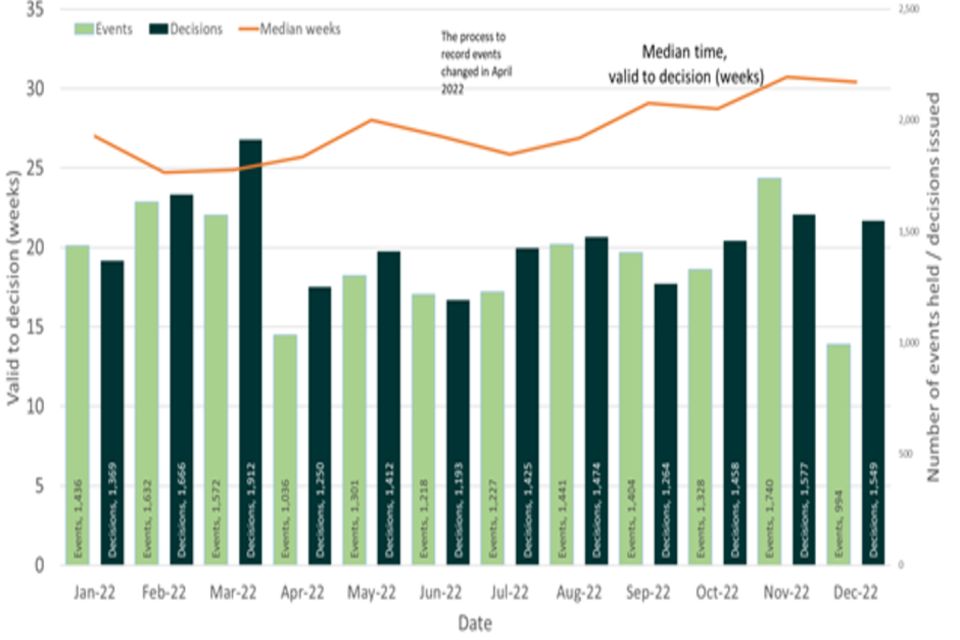
""
Source: Horizon, Picaso, Inspector Scheduling System
Note: The process and admin system used for events data has changed from April 2022. See Background Quality Report for more information
Table 1: Number of events held, decisions issued and median time between valid date & decision date; January 2022 to December 2022
Note: This table includes revisions to previously published data. Please see Annex D for further information
| Month | Jan 22 | Feb 22 | Mar 22 | Apr 22 | May 22 | Jun 22 | Jul 22 | Aug 22 | Sep 22 | Oct 22 | Nov 22 | Dec 22 | Total |
|---|---|---|---|---|---|---|---|---|---|---|---|---|---|
| Events Held | 1,436 | 1,632 | 1,572 | 1,036 | 1,301 | 1,218 | 1,227 | 1,441 | 1,404 | 1,328 | 1,740 | 994 | 16,329 |
| Decisions | 1,369 | 1,666 | 1,912 | 1,250 | 1,412 | 1,193 | 1,425 | 1,474 | 1,264 | 1,458 | 1,577 | 1,549 | 17,549 |
| Median | 27.0 | 24.7 | 24.9 | 25.7 | 28.0 | 27.0 | 25.9 | 26.9 | 29.1 | 28.7 | 30.7 | 30.4 | 27.3 |
Source: Horizon, Picaso, Inspector Scheduling System.
Early in 2022, PINS transitioned to a new system for scheduling casework and changed the way that specialist casework records are kept, bringing them in line with other case type records. This has resulted in approximately 200 extra cases being included in our open case counts from February 2022.
Figure 2 below shows the number of cases received, closed and open for each of the last 12 months. There is an upward trend to the number of open cases because most months more cases are received than closed. This was not true in December though and so the number of open cases has reduced over this month.
Figure 2: Number of cases received, closed and open; January 2022 to December 2022
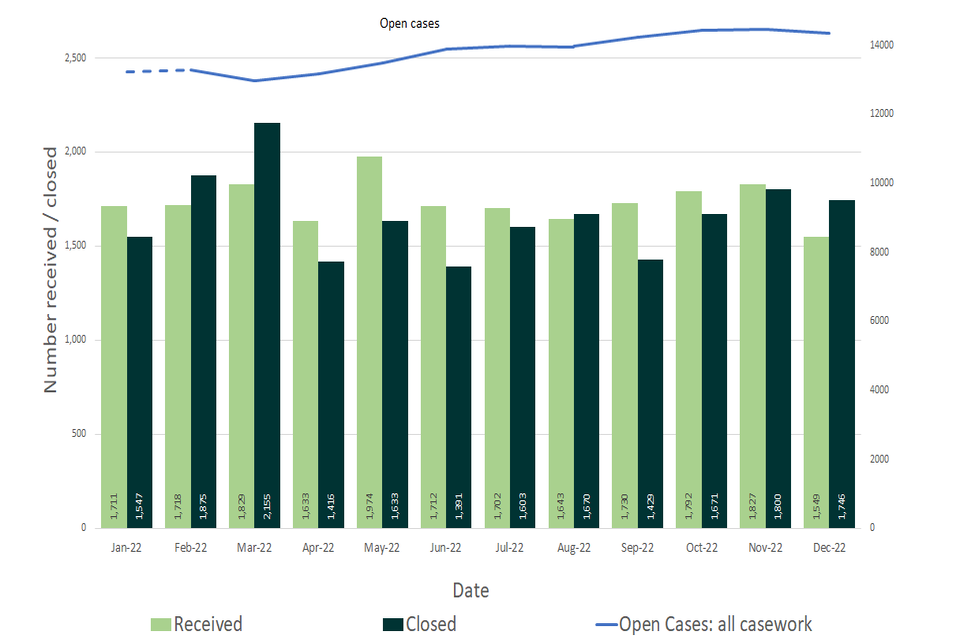
""
Source: Horizon and Picaso
Note 1: there is a known anomaly that means that the number of open cases does not exactly follow the volumes of cases closed or received (for example the number of open cases can increase between months even though the number closed exceeded the number received). The main reasons for this have been identified and are detailed in the Background Quality Report. The inspectorate are Investigating how to introduce new processes to improve the quality of this data which once complete may result in revisions to the number of open cases.
Note 2: Additional specialist casetypes are included in open case counts from February 2022
Note 3: The number of cases closed is higher than the number of decisions, as it includes cases where an appeal is withdrawn, notice is withdrawn, or the appeal is turned away.
Table 2: Number of cases received, closed and open; January 2022 to December 2022
Note 1: This table includes revisions to previously published data. Please see Annex D for further information
Note 2: Additional specialist casetypes are included in open case counts from February 2022
| Month | Jan 22 | Feb 22 | Mar 22 | Apr 22 | May 22 | Jun 22 | Jul 22 | Aug 22 | Sep 22 | Oct 22 | Nov 22 | Dec 22 | Total |
|---|---|---|---|---|---|---|---|---|---|---|---|---|---|
| Received | 1,711 | 1,718 | 1,829 | 1,633 | 1,974 | 1,712 | 1,702 | 1,643 | 1,730 | 1,792 | 1,827 | 1,549 | 21,023 |
| Closed | 1,547 | 1,875 | 2,155 | 1,416 | 1,633 | 1,391 | 1,603 | 1,670 | 1,429 | 1,671 | 1,800 | 1,746 | 19,866 |
| Open | 13241 | 13293 | 12976 | 13184 | 13498 | 13880 | 13977 | 13967 | 14242 | 14443 | 14467 | 14362 |
Source: Horizon and Picaso
3. Number of Decisions
The Planning Inspectorate has made 17,549 appeal decisions in the last 12 months. There were 1,549 cases decided in December. Table 3 below shows the monthly breakdown with fewer decisions for the months of April, June and September 2022.
Table 3: Appeal Decisions; January 2022 to December 2022
| Month | Jan 22 | Feb 22 | Mar 22 | Apr 22 | May 22 | Jun 22 | Jul 22 | Aug 22 | Sep 22 | Oct 22 | Nov 22 | Dec 22 | Total |
|---|---|---|---|---|---|---|---|---|---|---|---|---|---|
| Decisions | 1,369 | 1,666 | 1,912 | 1,250 | 1,412 | 1,193 | 1,425 | 1,474 | 1,264 | 1,458 | 1,577 | 1,549 | 17,549 |
Source: Horizon and Picaso
Figure 3 – Appeal Decisions; January 2022 to December 2022
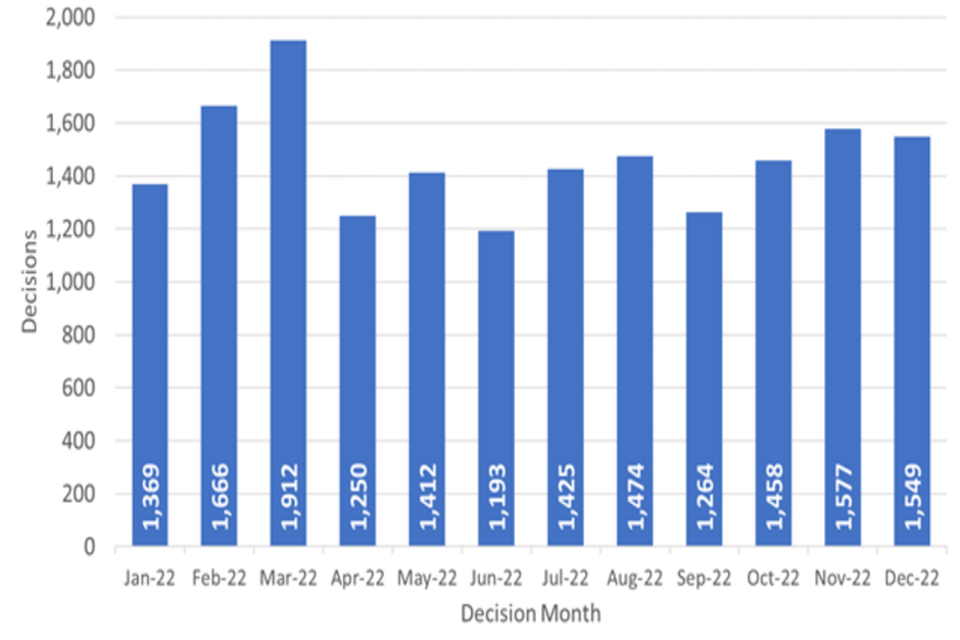
""
Source: Horizon and Picaso
3.1 Decisions by procedure and case type
Planning Inspectors work on a broader range of work than the appeals featured in this release. For example, they also work on examining Nationally Significant Infrastructure Project applications, Local Plans , Compulsory Purchase Order applications and many other specialist licencing/ application types.
Table 4 below gives the numbers of appeal decisions made broken down by whether the case was dealt with by written representations, hearings, or inquiries.
The large majority of decisions (16,246) were made on written representations. This is ninety two percent of all appeal decisions made. Table 4 shows that written representation decisions has varied from around 1,100 to over 1,800 per month over the past 12 months. (Pre-pandemic levels being between approximately 1,600 and 2,000 decisions per month). There were 1,346 decisions in December 2022.
There were 820 decisions made on hearings during the last 12 months, the monthly average being 68. During December 2022 157 decisions were issued, this is noticeably higher than the previous 11 months and was attributable to an increased focus on improving planning hearings performance and a large number of linked enforcement decisions . Pre-pandemic levels for hearing decisions were between 50 and 100 decisions per month. In December 2022 46 decisions were made for inquiries. Decisions for inquiries since January 2022 have ranged between 25 and 79. Pre-pandemic levels for inquiry decisions were between 15 and 90 decisions per month.
Table 4: Appeal Decisions by Procedure and Casework Category January 2022 to December 2022
| Month | Jan 22 | Feb 22 | Mar 22 | Apr 22 | May 22 | Jun 22 | Jul 22 | Aug 22 | Sep 22 | Oct 22 | Nov 22 | Dec 22 | Total |
|---|---|---|---|---|---|---|---|---|---|---|---|---|---|
| Written Representations | 1,249 | 1,594 | 1,815 | 1,154 | 1,288 | 1,105 | 1,338 | 1,356 | 1,171 | 1,374 | 1,456 | 1,346 | 16,246 |
| Hearings | 55 | 37 | 51 | 65 | 89 | 54 | 62 | 39 | 69 | 53 | 89 | 157 | 820 |
| Inquiries | 65 | 35 | 46 | 31 | 35 | 34 | 25 | 79 | 24 | 31 | 32 | 46 | 483 |
| Total | 1,369 | 1,666 | 1,912 | 1,250 | 1,412 | 1,193 | 1,425 | 1,474 | 1,264 | 1,458 | 1,577 | 1,549 | 17,549 |
| Month | Jan 22 | Feb 22 | Mar 22 | Apr 22 | May 22 | Jun 22 | Jul 22 | Aug 22 | Sep 22 | Oct 22 | Nov 22 | Dec 22 | Total |
| Planning | 1,107 | 1,409 | 1,603 | 980 | 1,145 | 1,004 | 1,171 | 1,159 | 1,015 | 1,262 | 1,337 | 1,296 | 14,488 |
| Enforcement | 213 | 220 | 253 | 174 | 215 | 138 | 167 | 224 | 184 | 142 | 174 | 196 | 2,300 |
| Specialist | 49 | 37 | 56 | 96 | 52 | 51 | 87 | 91 | 65 | 54 | 66 | 57 | 761 |
| Total | 1,369 | 1,666 | 1,912 | 1,250 | 1,412 | 1,193 | 1,425 | 1,474 | 1,264 | 1,458 | 1,577 | 1,549 | 17,549 |
Source: Horizon and Picaso.
What are Planning cases? The Planning category includes s78 planning appeals, householder appeals, commercial appeals, listed building consent appeals, advertisement appeals, s106 planning obligation appeals and Called In Planning Applications.
What are Enforcement cases? Enforcement covers enforcement appeals (i.e., appeals against the issue of an enforcement notice served by a local planning authority for alleged breaches of planning control), enforcement listed building notice appeals and lawful development certificate appeals.
What are Specialist cases? Specialist casework includes Common Land, Rights of Way orders (including Schedule 14 cases), Purchase orders, Tree Preservation Orders, High Hedges appeals, Hedgerow appeals, Wayleave, Compulsory Purchase Orders, Secretary of State, Transport, Environmental Permitting Appeals and Coastal Access. Additional casework types have been added to this category over time.
The large majority of cases were planning (14,488). This is about eighty-three per cent of all appeal decisions made. There were 2,300 enforcement decisions and 761 specialist decisions. These totals are also shown in Table 4 above and Figure 4 below.
Trends for planning decisions show similar patterns to written representations. The average number of enforcement decisions over the past 12 months was 192. March 22 had the most enforcement decisions of the past 12 months. Specialist casework figures continue to vary each month, from a low of 37 in February 2022 to a high of 96 in April 2022. The high number of cases decided in April was partly attributable to a large group of linked cases that were decided at the same time.
Figure 4 – Appeal Decisions by Procedure and Casework Category; January 2022 to December 2022
Appeal Decision by Procedure
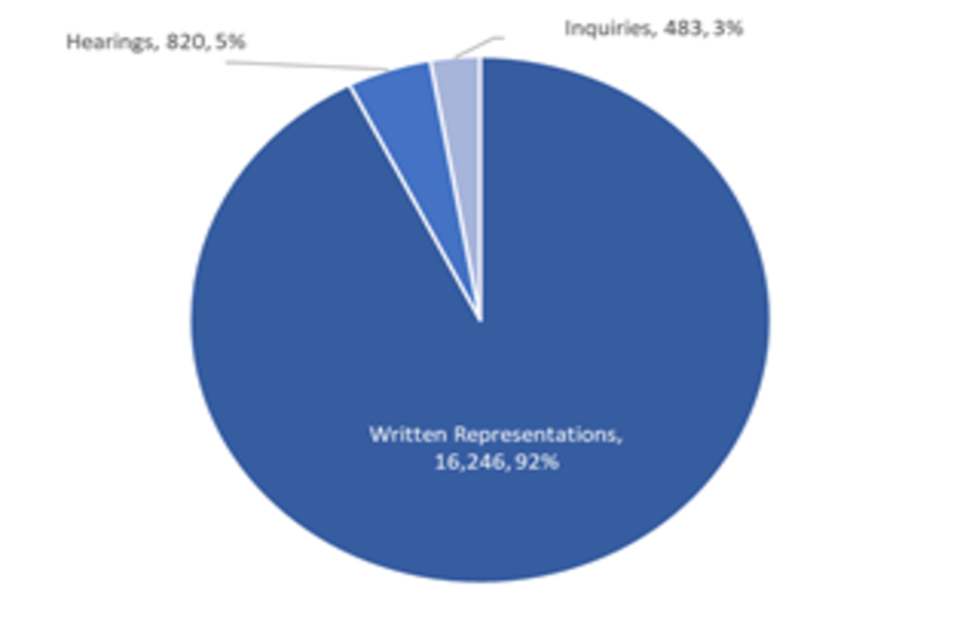
""
Appeal Decision by Casework Type
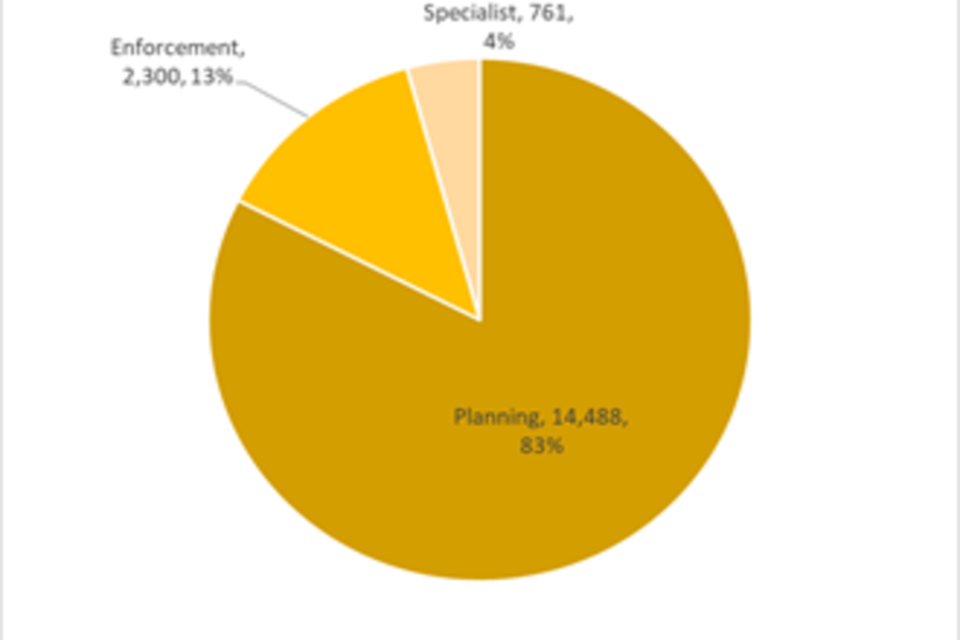
""
Source: Horizon and Picaso
4. Decision Timeliness
It is important for people to know how long an appeal is going to take, so that they can make informed plans and decisions. This section covers the timeliness of decisions (i.e., how long it takes to make a decision) across appeal casework. In addition to an overall measure, timeliness is analysed by procedure type and casework category, as timeliness varies a great deal depending on these characteristics.
Table 5 below shows that the median time to make a decision, across all cases in the past 12 months, was 27 weeks; and 30 weeks for December 2022. Figure 5 shows the median has ranged between 25 and 31 weeks in the past 12 months; and has been increasing.
How is timeliness measured?
The time to make a decision is measured from the time the Inspectorate have enough information for the case to proceed (it is deemed ‘valid’) to the time a decision letter is issued. This means that any delay in ‘validating’ the appeal is included in the time to make a decision.
The decisions made in a given month will include those that started many months before, and thus do not give an accurate indication of how long appeals submitted, or deemed ‘valid’ in that month, will take.
Table 5 also shows the mean time for the last 12 months is 33 weeks. Each month the median is less than the mean, due to the impact of very long cases. Also included in the table is the standard deviation of decision timeliness. The standard deviation – a measure of variation – is comparable to performance seen over the last 12 months.
What are mean, median and standard deviation?
| Measure | Definition |
|---|---|
| Mean | The total time taken divided by the number of cases. Also referred to as the ‘average’. A measure of how long each case would take, if the total time taken was spread evenly across all cases. |
| Median | This is the time taken by the ‘middle’ case if all cases were sorted from quickest to longest |
| Standard deviation | This is a measure of variability or spread. It is calculated by examining how much each value differs from the mean. A higher standard deviation means the individual decision times vary more widely around the mean. A lower standard deviation would demonstrate greater consistency in the Planning Inspectorate’s decision timeliness. |
Table 5: Median, mean and Standard Deviation of Time to Decision; January 2022 to December 2022
| Month | Jan 22 | Feb 22 | Mar 22 | Apr 22 | May 22 | Jun 22 | Jul 22 | Aug 22 | Sep 22 | Oct 22 | Nov 22 | Dec 22 | Total |
|---|---|---|---|---|---|---|---|---|---|---|---|---|---|
| Valid to Decision (median weeks) | 27.0 | 24.7 | 24.9 | 25.7 | 28.0 | 27.0 | 25.9 | 26.9 | 29.1 | 28.7 | 30.7 | 30.4 | 27.3 |
| Valid to Decision (mean weeks) | 31.9 | 28.3 | 30.7 | 31.3 | 36.3 | 32.9 | 33.2 | 33.7 | 34.4 | 33.2 | 36.5 | 35.8 | 33.1 |
| Standard Deviation (weeks) | 22.1 | 17.6 | 24.3 | 24.8 | 31.2 | 25.1 | 27.0 | 23.1 | 22.8 | 19.8 | 22.4 | 22.2 | 23.8 |
Source: Horizon and Picaso
Figure 5: Median and mean Time to Decision; January 2022 to December 2022
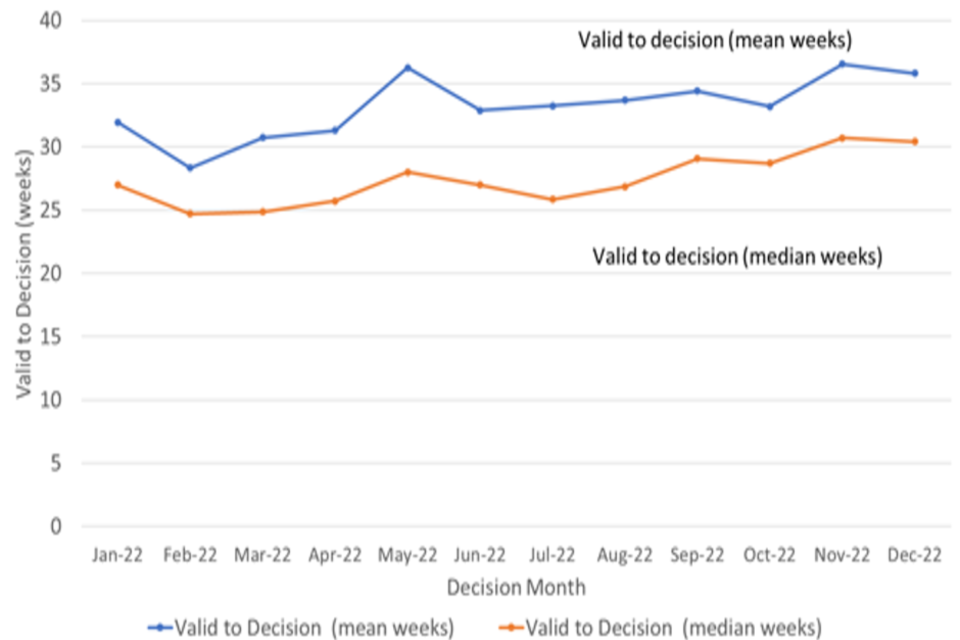
""
Source: Horizon and Picaso
4.1 Procedure Type
Table 6 below shows decision timeliness broken down by the procedure type. Hearings and inquires take longer than written representations , both types take roughly twice as long on average across the last 12 months. Because 19 of every 20 cases are by written representation, the timeliness measures for written representations are similar to the measure across all cases. Decision times for written representations were at their highest level for the 12 month period in November and December 2022.
Where a small number of cases has been decided, the average timeliness (whether mean or median) is less meaningful as a measure than where there are many cases. Those noted in the table caption below should be treated with caution as there are fewer than 20 cases decided.
Median times are less affected by a small number of large values than mean times, so are the focus of this commentary. The median time for written representations over the 12 months to December 2022 is 26 weeks. The median time for hearings over the 12 months to December 2022 is 58 weeks and 45 weeks for inquiries.
Table 6: Mean and Median Time to Decision, with Standard Deviation, by Procedure; January 2022 to December 2022
Note 1: where the number of decisions issued is fewer than 20, the measures mean, median and standard deviation are less meaningful.
| Measure | Procedure | Jan-22 | Feb-22 | Mar-22 | Apr-22 | May-22 | Jun-22 | Jul-22 | Aug-22 | Sep-22 | Oct-22 | Nov-22 | Dec-22 | Total |
|---|---|---|---|---|---|---|---|---|---|---|---|---|---|---|
| Valid to decision (median weeks) | Written Representations | 25.4 | 24.1 | 24.3 | 24.4 | 26.9 | 26.1 | 25.1 | 26.1 | 28.6 | 28.4 | 30.1 | 29.1 | 26.4 |
| Valid to decision (median weeks) | Hearings | 64.1 | 45.7 | 52.9 | 108.3 | 94.0 | 61.0 | 58.2 | 63.0 | 41.1 | 40.9 | 51.0 | 54.4 | 57.5 |
| Valid to decision (median weeks) | Inquiries | 68.7 | 57.3 | 42.1 | 38.4 | 44.3 | 39.6 | 31.1 | 68.6 | 36.5 | 29.6 | 41.1 | 38.6 | 44.6 |
| Valid to decision (median weeks) | All Cases | 27.0 | 24.7 | 24.9 | 25.7 | 28.0 | 27.0 | 25.9 | 26.9 | 29.1 | 28.7 | 30.7 | 30.4 | 27.3 |
| Valid to decision (mean weeks) | Written Representations | 28.1 | 27.0 | 29.1 | 27.2 | 30.4 | 29.7 | 30.3 | 30.7 | 32.8 | 32.5 | 34.8 | 32.9 | 30.4 |
| Valid to decision (mean weeks) | Hearings | 75.7 | 57.5 | 61.1 | 90.8 | 112.3 | 86.7 | 85.3 | 67.8 | 51.4 | 45.1 | 56.5 | 58.7 | 70.9 |
| Valid to decision (mean weeks) | Inquiries | 68.9 | 60.7 | 60.7 | 57.7 | 57.7 | 51.3 | 60.6 | 68.2 | 62.3 | 44.3 | 58.4 | 42.1 | 59.0 |
| Valid to decision (mean weeks) | All Cases | 31.9 | 28.3 | 30.7 | 31.3 | 36.3 | 32.9 | 33.2 | 33.7 | 34.4 | 33.2 | 36.5 | 35.8 | 33.1 |
| Standard Deviation (weeks) | Written Representations | 15.3 | 15.1 | 22.3 | 17.2 | 18.4 | 17.1 | 20.8 | 19.0 | 20.1 | 18.6 | 19.7 | 18.2 | 18.9 |
| Standard Deviation (weeks) | Hearings | 43.8 | 33.1 | 27.6 | 37.6 | 59.8 | 61.7 | 55.6 | 43.1 | 31.5 | 24.8 | 34.7 | 35.9 | 46.8 |
| Standard Deviation (weeks) | Inquiries | 29.4 | 35.4 | 45.8 | 46.2 | 36.7 | 35.4 | 53.8 | 30.4 | 54.9 | 40.8 | 43.4 | 18.3 | 38.9 |
| Standard Deviation (weeks) | All Cases | 22.1 | 17.6 | 24.3 | 24.8 | 31.2 | 25.1 | 27.0 | 23.1 | 22.8 | 19.8 | 22.4 | 22.2 | 23.8 |
| Decisions | Written Representations | 1,249 | 1,594 | 1,815 | 1,154 | 1,288 | 1,105 | 1,338 | 1,356 | 1,171 | 1,374 | 1,456 | 1,346 | 16,246 |
| Decisions | Hearings | 55 | 37 | 51 | 65 | 89 | 54 | 62 | 39 | 69 | 53 | 89 | 157 | 820 |
| Decisions | Inquiries | 65 | 35 | 46 | 31 | 35 | 34 | 25 | 79 | 24 | 31 | 32 | 46 | 483 |
| Decisions | Total | 1,369 | 1,666 | 1,912 | 1,250 | 1,412 | 1,193 | 1,425 | 1,474 | 1,264 | 1,458 | 1,577 | 1,549 | 17,549 |
Source: Horizon and Picaso.
The standard deviation information indicates that for all three procedures, there is considerable variation, meaning times are widely spread about the mean. For written representations, the amount of variation has been quite stable over recent months, whereas hearings and enquiries have experienced considerable month to month changes in the spread of decision times.
4.2 Casework Category
The nature of the cases the Planning Inspectorate deal with varies widely and several factors play a part in determining how long it takes to make a decision. One such factor is the type of casework. Table 7 below shows the time taken to decide, in planning cases, in enforcement cases, and in specialist cases, as does Figure 6.
The median time to decision for planning cases (there are many more of these decisions than in the other categories) is lower than for enforcement cases; and less variable than the times for specialist cases. Table 7 and Figure 6 show the median time for planning cases has been 24 weeks or above for the last twelve months. Table 7: Decisions, Mean, Median and Standard Deviation of Time to Decision – Planning, Enforcement, Specialist Cases; January 2022 to December 2022
| Appeal Type | Measure | Jan-22 | Feb-22 | Mar-22 | Apr-22 | May-22 | Jun-22 | Jul-22 | Aug-22 | Sep-22 | Oct-22 | Nov-22 | Dec-22 | Total |
|---|---|---|---|---|---|---|---|---|---|---|---|---|---|---|
| Planning Cases | Valid to decision (median wks) | 25.3 | 24.3 | 23.6 | 24.9 | 27.0 | 26.0 | 25.0 | 25.1 | 27.0 | 27.4 | 29.1 | 28.9 | 26.0 |
| Planning Cases | Valid to decision (mean wks) | 28.1 | 26.3 | 25.7 | 26.6 | 30.3 | 29.3 | 29.1 | 28.7 | 30.8 | 30.6 | 33.0 | 31.4 | 29.1 |
| Planning Cases | Standard deviation of decision (weeks) | 16.3 | 13.9 | 15.0 | 15.3 | 21.6 | 17.9 | 20.4 | 17.6 | 18.2 | 15.9 | 17.6 | 16.0 | 17.3 |
| Enforcement Cases | Valid to decision (median wks) | 38.7 | 31.1 | 44.6 | 48.0 | 56.1 | 40.9 | 42.1 | 58.6 | 44.7 | 44.1 | 52.1 | 62.8 | 47.0 |
| Enforcement Cases | Valid to decision (mean wks) | 49.8 | 39.9 | 57.5 | 59.7 | 66.6 | 56.3 | 56.5 | 56.1 | 51.1 | 50.5 | 59.6 | 62.4 | 55.5 |
| Enforcement Cases | Standard deviation of decision (weeks) | 32.1 | 26.7 | 39.8 | 40.8 | 50.0 | 47.0 | 41.0 | 29.6 | 29.3 | 26.7 | 32.3 | 31.4 | 36.9 |
| Specialist Cases | Valid to decision (median wks) | 29.4 | 26.0 | 33.7 | 12.7 | 28.4 | 31.4 | 24.7 | 31.3 | 29.4 | 35.4 | 35.3 | 27.0 | 28.9 |
| Specialist Cases | Valid to decision (mean wks) | 41.6 | 39.5 | 54.3 | 27.4 | 42.0 | 41.6 | 45.0 | 42.3 | 43.8 | 47.9 | 49.0 | 45.1 | 42.6 |
| Specialist Cases | Standard deviation of decision (weeks) | 37.0 | 36.4 | 46.1 | 30.0 | 35.0 | 27.1 | 41.5 | 29.7 | 37.4 | 40.3 | 35.0 | 35.3 | 36.5 |
Source: Horizon and Picaso.
Annex A gives information on median and mean time to decision, with standard deviation, for the three procedure types, split by planning, enforcement, and specialist casework categories.
Enforcement decisions made in the last 12 months had a median decision time of 47 weeks.
There are considerably fewer specialist cases which means results are more liable to be distorted by extreme values. Looking at the annual measures, the median time to decision for specialist decisions have been shorter than enforcement decisions, and quite similar to the median for planning decisions.
Figure 6 – Median Time to Decision by Casework Category: January 2022 to December 2022
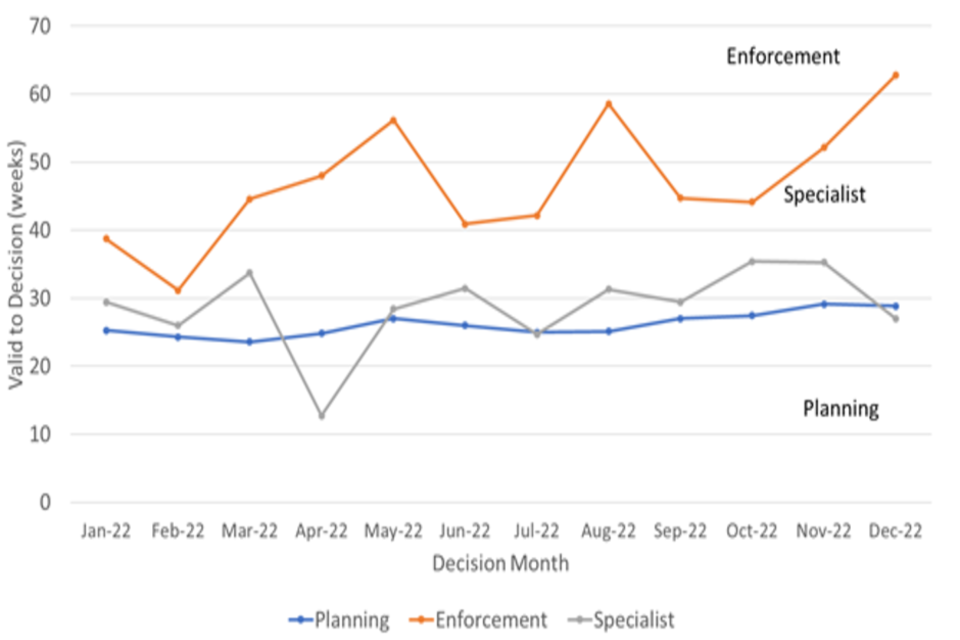
""
Source: Horizon and Picaso
Note that the Inspectorate publishes each month, information on the mean and median times from valid to decision, for selected appeal types. The information published also breaks down the time for each stage of the process. See Annex B for further details.
4.3 Planning Inquiry Decisions
For planning appeals decided by the inquiry process, The Planning Inspectorate has been implementing recommendations from the Rosewell review.
The median time for inquiries under Rosewell process over the 12 months to December 2022 is 36 weeks and the median time to decision for December 2022 was 37 weeks.
Table 8: Decisions, Mean and Median Time to Decision, Planning Inquiry Cases under Rosewell Process; January 2022 to December 2022
Note 1: where there are fewer than 20 decisions, the measures mean, median and standard deviation are less meaningful.
| Measure | Jan 22 | Feb 22 | Mar 22 | Apr 22 | May 22 | Jun 22 | Jul 22 | Aug 22 | Sep 22 | Oct 22 | Nov 22 | Dec 22 | Total |
|---|---|---|---|---|---|---|---|---|---|---|---|---|---|
| Decisions | 21.0 | 23.0 | 22.0 | 14.0 | 24.0 | 21.0 | 13.0 | 18.0 | 11.0 | 23.0 | 19.0 | 38.0 | 247 |
| Median (weeks) | 31.9 | 42.1 | 30.0 | 30.2 | 32.1 | 31.0 | 23.3 | 26.0 | 28.6 | 26.0 | 29.4 | 38.6 | 30.1 |
| mean (weeks) | 37.8 | 47.0 | 35.5 | 35.5 | 41.6 | 33.0 | 23.9 | 30.9 | 29.5 | 29.1 | 38.0 | 36.9 | 35.7 |
| St. Dev. (weeks) | 19.6 | 19.7 | 14.2 | 13.6 | 19.2 | 9.8 | 4.6 | 14.0 | 9.4 | 10.8 | 20.8 | 6.5 | 15.6 |
Most inquiry decisions now being issued are under the revised ‘Rosewell’ process but some inquiries, for example those that are linked together with associated enforcement cases, do not follow the Rosewell process.
Table 9: Decisions, Planning Inquiry Cases under non-Rosewell Process; January 2022 to December 2022
| Month | Jan 22 | Feb 22 | Mar 22 | Apr 22 | May 22 | Jun 22 | Jul 22 | Aug 22 | Sep 22 | Oct 22 | Nov 22 | Dec 22 | Total |
|---|---|---|---|---|---|---|---|---|---|---|---|---|---|
| Decisions | 2 | 0 | 3 | 3 | 1 | 1 | 2 | 3 | 0 | 1 | 1 | 1 | 18 |
Source: Horizon
Figure 7 below shows the mean and median time to decision for planning inquiry cases under the Rosewell process.
Figure 7: Mean and Median Time to Decision, Rosewell Inquiry Process; January 2022 to December 2022
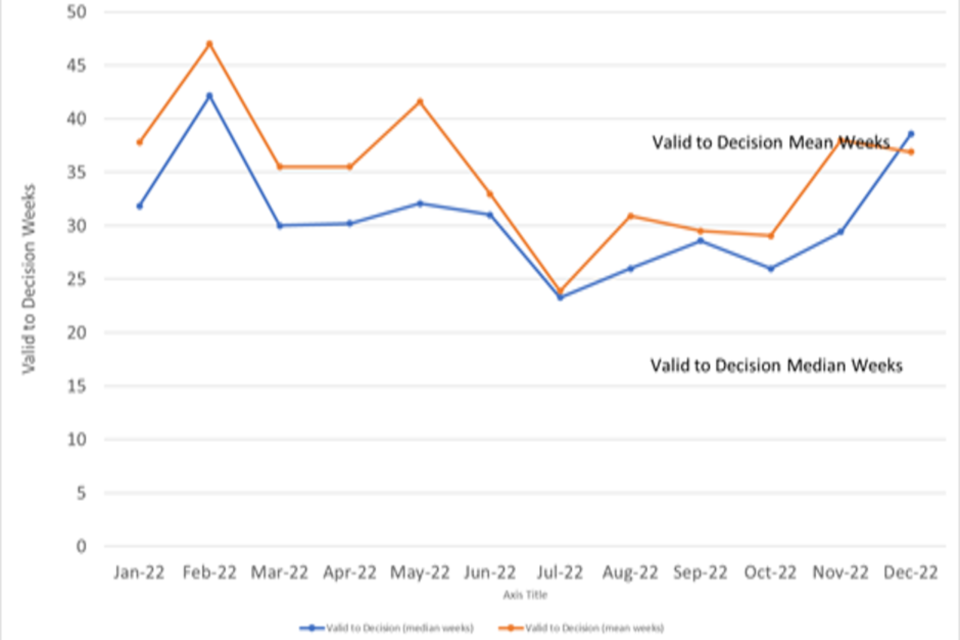
""
Source: Horizon
5. Open Cases
At the end of December 2022, the Planning Inspectorate had 14,362 cases open, this is lower than November. More information on the number of open cases, and how it has changed over the past 12 months, is in Table 2 and Figure 2 above.
The open cases comprised of 12,754 cases being handled through written representations; 865 through hearings; and 690 through inquiries, as well as 53 not currently allocated a procedure type. This is not the number of ‘live’ hearings and inquiries since it includes cases where the event (hearing or inquiry) has yet to start, as well as those where the event has finished but the decision has yet to be issued.
For each procedure type, there are more cases with an event yet to start, than at any other stage in the process. Event refers to either a site visit, hearing, or inquiry.
Table 10: Open cases by procedure and stage, as of end of December 2022
| Stage | Written Representations | Hearings | Inquiries | Total |
|---|---|---|---|---|
| Cases received but yet to be deemed valid | 1,970 | 86 | 2 | 2,058 |
| Cases deemed valid but yet to ‘start’ | 3,271 | 151 | 99 | 3,556 |
| Case started but event (site visit/hearing/inquiry) has not yet happened | 7,433 | 573 | 485 | 8,506 |
| Event has happened/started but decision not yet issued | 80 | 55 | 104 | 242 |
| Total | 12,754 | 865 | 690 | 14,362 |
Source: Horizon
Note 1 - there are 53 cases that have no procedure type recorded (see Background Quality Report for more detail) These are included in the total but excluded from the breakdown by procedure.
Note 2 – there is a known anomaly that means that the number of open cases does not exactly follow the volumes of cases closed or received (for example the number of open cases can increase between months even though the number closed exceeded the number received). The main reasons for this have been identified and are detailed in the Background Quality Report. The inspectorate are investigating how to introduce new processes to improve the quality of this data which once complete may result in revisions to the number of open cases.
6. Inspectors
Table 11 below shows the number of salaried inspectors in the Planning Inspectorate in each month from January 2022 to December 2022 . This includes headcount (i.e. the number of different individuals) and full-time equivalents (FTE) where those working part time are counted in proportion with their contracted hours. There were 390 Planning Inspectors employed by the Inspectorate in November 2022 – with a full-time equivalent of 348.
Table 11: Planning Inspectors – Headcount and FTE; January 2022 to December 2022 (at end of month)
| Month | Jan 22 | Feb 22 | Mar 22 | Apr 22 | May 22 | Jun 22 | Jul 22 | Aug 22 | Sep 22 | Oct 22 | Nov 22 | Dec 22 |
|---|---|---|---|---|---|---|---|---|---|---|---|---|
| Headcount | 360 | 357 | 357 | 355 | 365 | 371 | 378 | 376 | 388 | 391 | 390 | 390 |
| FTE | 320.9 | 318.9 | 319.1 | 316.6 | 325.9 | 331.5 | 337.7 | 335.0 | 346.2 | 348.9 | 348.3 | 348.3 |
Source: SAP HR
As above, Planning Inspectors work on a broader range of work than the appeals featured in this Release. Please note that data on Planning Inspectors only covers salaried employees - it does not include fixed term contract Inspectors or Planning and Appeal Decision Suppliers (previously referred to as non-salaried Inspectors).
7. Revisions to previous release
Data in the previous statistical release may have changed between being published last month and what is shown this month. Where changes have occurred (the volume numbers have changed by more than five, or the timeliness measures have changed by greater than 0.5 weeks) the tables in this release give the most recent figures. Information about which tables this applies to, can be found in Annex C and the separate Background Quality Report.
8. Quarterly Statistics
The Inspectorate has also published a series of tables of quarterly data. Some of the data published is on casework types that The Planning Inspectorate deals with that are larger in scale, but smaller in volume, than the appeals decisions that are the subject of the preceding sections of these statistics. The best examples of this are Nationally Significant Infrastructure Projects and Local Plans, where volumes never go into the hundreds, and the time between submission to report issue can be over a year. Other data breaks appeals down into more detail than in the monthly totals.
8.1 Appeals against refusal of Planning Permission (Section 78 appeals)
The largest volume of casework dealt with by the Planning Inspectorate are appeals against refusal of Planning Permission, which are made under section 78 of the Town and Country Planning Act 1990. The analysis below deals with just this casework type although figures for other casework types can be found in the published quarterly statistics.
8.2 Number of appeals received compared to decisions issued.
In the last twelve months, January 2022 to December 2022, there have been 10,765 Section 78 planning appeals (s78) received, which is broadly similar to 10,834 for the period January 2021 to December 2021.
In the last five complete financial years (April 2017 to March 2022) the highest level of quarterly receipts (3,684) occurred in October to December 2017 and the highest number of decisions (3,705) was in July to September 2019. Over the past year the average number of receipts per quarter was 2,691 and the average number of decisions per quarter was 2,253.
The number of appeals received in the third quarter of 2022/23 (2,700) was 1.0% lower than the same period in 2021/22. Appeal receipts since the pandemic started average 2,691 per quarter (April 20 to December 22). Between Jan - Dec 2019, the last 4 quarters before the pandemic, the Inspecotrate received an average of 2,923 appeals per quarter.
Figure 8: Number of s78 Planning appeals, receipts and decisions, 2017/18 to 2022/23, by quarter
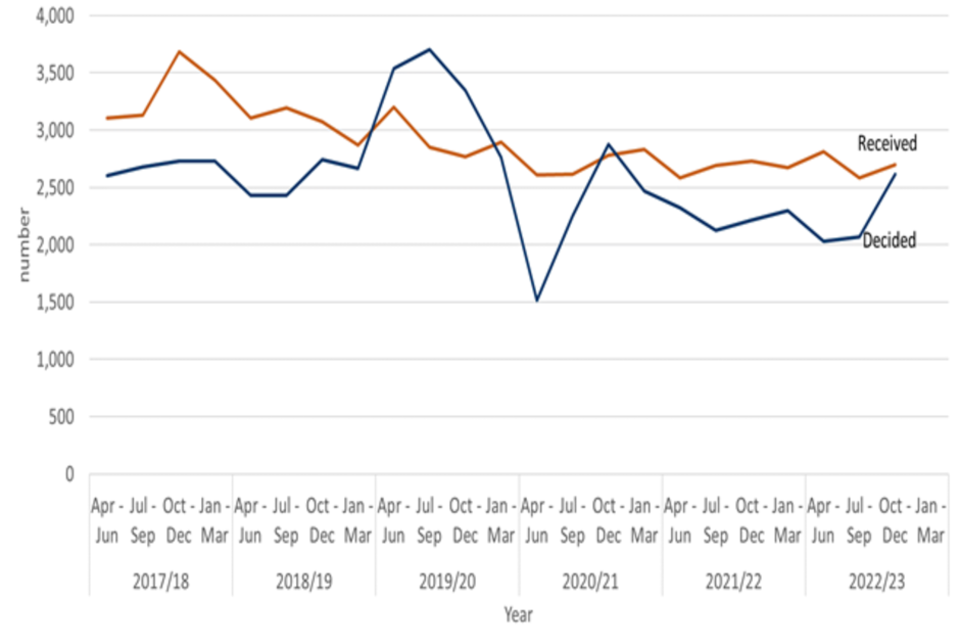
""
Source: Horizon & Picaso. Full published data in Tables 2.1 and Table 2.4.
See Annex E, Table A, for full data table.
The number of decisions issued in October to December 2022, was the highest for a quarter since October to December 2020. It was 27% more than the previous quarter and 18% more than the corresponding quarter last year.
8.3 Appeals Allowed
The percentage of Section 78 planning appeals that were allowed in the latest quarter was 29%. Over the past 6 quarters the percentage of appeals allowed has been 28% or 29% each quarter. (see figure 9) There were 747 appeals allowed between October and December 2022. This is the highest number for a quarter since October to December 2020. (see Figure 11).
The consistency in the overall percentage allowed is heavily influenced by the number of written representations appeals allowed, as this procedure type contributes by far the greatest number of decisions each year. There has been slightly more variation in the percentage allowed for hearings and inquiries. See Figure 10 below for further details.
Figure 9: S78 planning appeals, percentage allowed, 2017/18 to 2022/23, by quarter
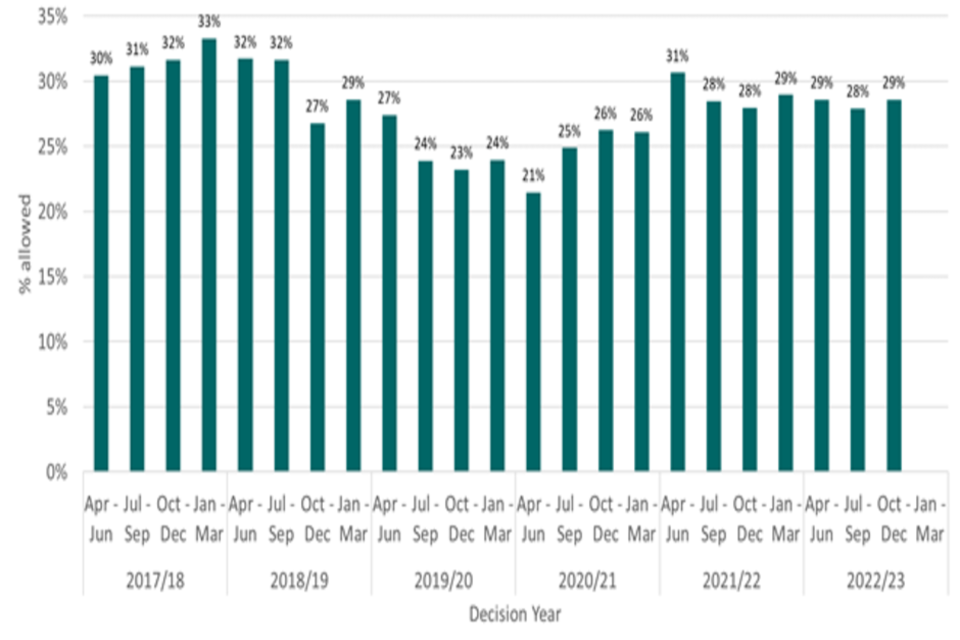
""
Source: Horizon & Picaso. Full published data in Table 2.4 s78 planning appeals decided.
See Annex E, Table B, for full data table
Figure 10: S78 planning appeals, percentage allowed by procedure type, 2017/18 to 2022/23, by quarter
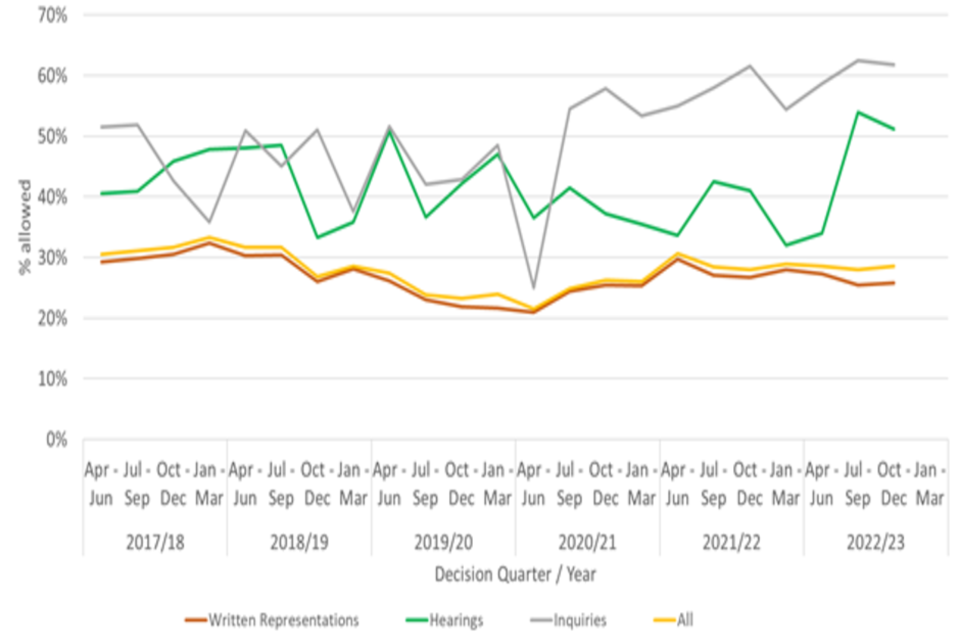
""
Source: Horizon & Picaso. Full published data in Table 2.4 s78 planning appeals decided.
See Annex E, Table B, for full data table
Figure 11: S78 planning appeals, number of appeals allowed, 2017/18 to 2022/23, by quarter
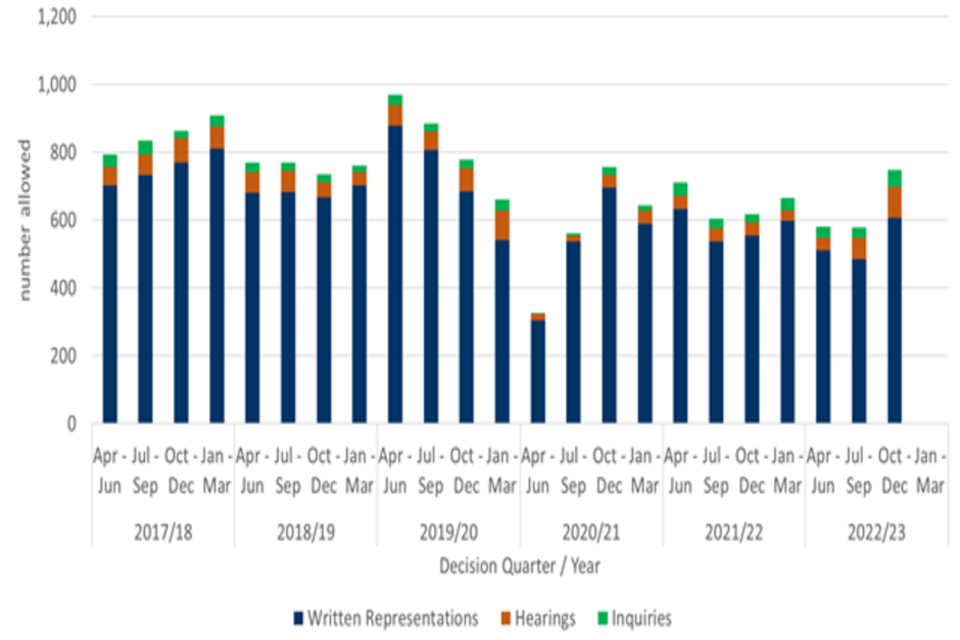
""
Source: Horizon & Picaso. Full published data in Table 2.4 s78 planning appeals decided.
See Annex E, Table C, for full data table
9. Annex A: Mean and median time to decide, standard deviation, for planning, enforcement and specialist casework
Planning
Note: where there are fewer than 20 decisions, the measures mean, median and standard deviation are less meaningful. This applies to April, July and September 2022 for inquiries decisions.
| Planning | Measure | Jan-22 | Feb-22 | Mar-22 | Apr-22 | May-22 | Jun-22 | Jul-22 | Aug-22 | Sep-22 | Oct-22 | Nov-22 | Dec-22 | Total |
|---|---|---|---|---|---|---|---|---|---|---|---|---|---|---|
| Written Representations | Decisions | 1,051 | 1,356 | 1,543 | 932 | 1,077 | 945 | 1,110 | 1,111 | 957 | 1,197 | 1,254 | 1,174 | 13,707 |
| Written Representations | Median Average Weeks | 24.7 | 23.9 | 23.1 | 24.2 | 26.3 | 25.4 | 24.4 | 24.9 | 26.9 | 27.4 | 29.0 | 28.1 | 25.6 |
| Written Representations | Mean Average Weeks | 26.5 | 25.3 | 25.0 | 25.2 | 27.6 | 27.7 | 26.9 | 27.9 | 30.1 | 30.4 | 32.3 | 30.4 | 27.9 |
| Written Representations | Standard Deviation Weeks | 12.4 | 12.5 | 14.3 | 12.2 | 13.8 | 14.5 | 13.9 | 15.7 | 17.1 | 15.6 | 16.4 | 14.3 | 14.6 |
| Hearings | Decisions | 33 | 30 | 35 | 31 | 43 | 37 | 46 | 27 | 47 | 41 | 63 | 83 | 516 |
| Hearings | Median Average Weeks | 55.9 | 43.6 | 48.4 | 53.0 | 61.4 | 51.1 | 55.9 | 42.6 | 38.3 | 32.0 | 39.0 | 34.3 | 46.4 |
| Hearings | Mean Average Weeks | 70.7 | 51.5 | 52.5 | 64.8 | 90.0 | 66.4 | 81.2 | 55.4 | 45.8 | 39.7 | 44.8 | 42.9 | 57.0 |
| Hearings | Standard Deviation Weeks | 39.0 | 27.0 | 20.2 | 34.9 | 58.4 | 41.6 | 55.3 | 43.0 | 30.5 | 23.1 | 30.1 | 29.5 | 40.6 |
| Inquiries | Decisions | 23 | 23 | 25 | 17 | 25 | 22 | 15 | 21 | 11 | 24 | 20 | 39 | 265 |
| Inquiries | Median Average Weeks | 31.9 | 42.1 | 28.0 | 33.7 | 33.6 | 31.1 | 24.0 | 26.0 | 28.6 | 25.9 | 29.4 | 38.6 | 30.9 |
| Inquiries | Mean Average Weeks | 41.0 | 47.0 | 35.6 | 37.4 | 45.3 | 34.6 | 29.4 | 37.5 | 29.5 | 28.5 | 41.2 | 38.6 | 37.8 |
| Inquiries | Standard Deviation Weeks | 25.4 | 19.7 | 15.1 | 13.7 | 26.1 | 12.0 | 14.8 | 27.2 | 9.4 | 10.8 | 24.6 | 12.4 | 19.6 |
| All Cases | Decisions | 1,107 | 1,409 | 1,603 | 980 | 1,145 | 1,004 | 1,171 | 1,159 | 1,015 | 1,262 | 1,337 | 1,296 | 14,488 |
| All Cases | Median Average Weeks | 25.3 | 24.3 | 23.6 | 24.9 | 27.0 | 26.0 | 25.0 | 25.1 | 27.0 | 27.4 | 29.1 | 28.9 | 26.0 |
| All Cases | Mean Average Weeks | 28.1 | 26.3 | 25.7 | 26.6 | 30.3 | 29.3 | 29.1 | 28.7 | 30.8 | 30.6 | 33.0 | 31.4 | 29.1 |
| All Cases | Standard Deviation Weeks | 16.3 | 13.9 | 15.0 | 15.3 | 21.6 | 17.9 | 20.4 | 17.6 | 18.2 | 15.9 | 17.6 | 16.0 | 17.3 |
Enforcement
Note: where there are fewer than 20 decisions, the measures mean, median and standard deviation are less meaningful. This applies to all month for hearing other than April, May and November and December decisions and all months for inquiry decisions other than January and August 2022.
| Enforcement | Measure | Jan-22 | Feb-22 | Mar-22 | Apr-22 | May-22 | Jun-22 | Jul-22 | Aug-22 | Sep-22 | Oct-22 | Nov-22 | Dec-22 | Total |
|---|---|---|---|---|---|---|---|---|---|---|---|---|---|---|
| Written Representations | Decisions | 155 | 203 | 225 | 131 | 165 | 119 | 154 | 164 | 159 | 128 | 145 | 122 | 1,870 |
| Written Representations | Median Average Weeks | 31.7 | 28.6 | 42.6 | 36.7 | 45.7 | 37.3 | 39.0 | 40.0 | 44.4 | 39.7 | 49.3 | 54.1 | 39.0 |
| Written Representations | Mean Average Weeks | 37.2 | 36.6 | 55.0 | 44.8 | 47.6 | 43.1 | 52.7 | 46.3 | 48.1 | 49.0 | 54.1 | 54.9 | 47.4 |
| Written Representations | Standard Deviation Weeks | 22.1 | 21.9 | 38.9 | 29.1 | 28.6 | 24.2 | 36.3 | 25.3 | 23.4 | 26.9 | 28.5 | 27.8 | 29.3 |
| Hearings | Decisions | 19 | 6 | 11 | 31 | 43 | 11 | 10 | 6 | 14 | 11 | 20 | 71 | 253 |
| Hearings | Median Average Weeks | 66.7 | 55.7 | 63.0 | 118.9 | 170.3 | 223.7 | 75.0 | 99.6 | 39.7 | 53.7 | 93.0 | 68.1 | 86.0 |
| Hearings | Mean Average Weeks | 81.8 | 72.3 | 64.9 | 111.8 | 136.5 | 165.3 | 107.1 | 101.1 | 57.5 | 64.6 | 85.5 | 75.2 | 95.2 |
| Hearings | Standard Deviation Weeks | 47.4 | 36.3 | 22.5 | 19.0 | 52.8 | 70.8 | 64.4 | 25.4 | 30.0 | 22.2 | 19.6 | 33.1 | 48.9 |
| Inquiries | Decisions | 39 | 11 | 17 | 12 | 7 | 8 | 3 | 54 | 11 | 3 | 9 | 3 | 177 |
| Inquiries | Median Average Weeks | 90.9 | 71.9 | 58.3 | 49.3 | 78.0 | 96.1 | 52.7 | 68.6 | 62.3 | 67.6 | 58.6 | 45.1 | 68.7 |
| Inquiries | Mean Average Weeks | 84.1 | 84.0 | 86.0 | 88.5 | 86.7 | 103.3 | 81.7 | 80.9 | 85.9 | 61.2 | 89.2 | 63.4 | 84.2 |
| Inquiries | Standard Deviation Weeks | 16.9 | 44.0 | 48.0 | 60.7 | 37.2 | 35.9 | 43.7 | 22.2 | 62.5 | 12.2 | 57.6 | 28.7 | 37.7 |
| All Cases | Decisions | 213 | 220 | 253 | 174 | 215 | 138 | 167 | 224 | 184 | 142 | 174 | 196 | 2,300 |
| All Cases | Median Average Weeks | 38.7 | 31.1 | 44.6 | 48.0 | 56.1 | 40.9 | 42.1 | 58.6 | 44.7 | 44.1 | 52.1 | 62.8 | 47.0 |
| All Cases | Mean Average Weeks | 49.8 | 39.9 | 57.5 | 59.7 | 66.6 | 56.3 | 56.5 | 56.1 | 51.1 | 50.5 | 59.6 | 62.4 | 55.5 |
| All Cases | Standard Deviation Weeks | 32.1 | 26.7 | 39.8 | 40.8 | 50.0 | 47.0 | 41.0 | 29.6 | 29.3 | 26.7 | 32.3 | 31.4 | 36.9 |
Specialist
Note: where there are fewer than 20 decisions, the measures mean, median and standard deviation are less meaningful. This applies to all months’ hearings decisions; and all months inquiries decisions.
| Specialist | Measure | Jan-22 | Feb-22 | Mar-22 | Apr-22 | May-22 | Jun-22 | Jul-22 | Aug-22 | Sep-22 | Oct-22 | Nov-22 | Dec-22 | Total |
|---|---|---|---|---|---|---|---|---|---|---|---|---|---|---|
| Written Representations | Decisions | 43 | 35 | 47 | 91 | 46 | 41 | 74 | 81 | 55 | 49 | 57 | 50 | 669 |
| Written Representations | Median Average Weeks | 29.0 | 24.9 | 26.9 | 11.3 | 24.4 | 25.1 | 22.6 | 27.9 | 26.0 | 33.9 | 32.1 | 26.9 | 26.0 |
| Written Representations | Mean Average Weeks | 35.0 | 33.9 | 42.8 | 23.2 | 35.5 | 37.6 | 35.1 | 38.1 | 37.0 | 41.4 | 42.9 | 39.7 | 36.0 |
| Written Representations | Standard Deviation Weeks | 30.1 | 28.9 | 36.7 | 22.1 | 28.7 | 26.9 | 30.5 | 26.7 | 33.1 | 30.7 | 29.7 | 30.5 | 29.8 |
| Hearings | Decisions | 3 | 1 | 5 | 3 | 3 | 6 | 6 | 6 | 8 | 1 | 6 | 3 | 51 |
| Hearings | Median Average Weeks | 130.1 | 149.1 | 119.0 | 141.0 | 90.9 | 71.4 | 76.4 | 82.6 | 67.5 | 50.4 | 60.6 | 85.1 | 79.0 |
| Hearings | Mean Average Weeks | 93.2 | 149.1 | 113.3 | 141.5 | 85.7 | 68.0 | 80.7 | 90.5 | 73.5 | 50.4 | 83.6 | 107.3 | 89.7 |
| Hearings | Standard Deviation Weeks | 58.0 | 0.0 | 23.2 | 15.4 | 29.0 | 12.0 | 24.4 | 28.4 | 27.5 | 0.0 | 45.5 | 41.7 | 37.5 |
| Inquiries | Decisions | 3 | 1 | 4 | 2 | 3 | 4 | 7 | 4 | 2 | 4 | 3 | 4 | 41 |
| Inquiries | Median Average Weeks | 95.1 | 119.7 | 109.4 | 44.8 | 80.9 | 43.9 | 165.6 | 55.4 | 112.9 | 128.7 | 91.1 | 48.1 | 75.1 |
| Inquiries | Mean Average Weeks | 84.0 | 119.7 | 110.0 | 44.8 | 94.1 | 39.1 | 118.5 | 56.5 | 112.9 | 126.5 | 80.0 | 60.0 | 88.0 |
| Inquiries | Standard Deviation Weeks | 29.6 | 0.0 | 61.3 | 1.6 | 47.2 | 13.6 | 58.4 | 21.0 | 51.2 | 60.3 | 27.6 | 31.1 | 52.7 |
| All Cases | Decisions | 49 | 37 | 56 | 96 | 52 | 51 | 87 | 91 | 65 | 54 | 66 | 57 | 761 |
| All Cases | Median Average Weeks | 29.4 | 26.0 | 33.7 | 12.7 | 28.4 | 31.4 | 24.7 | 31.3 | 29.4 | 35.4 | 35.3 | 27.0 | 28.9 |
| All Cases | Mean Average Weeks | 41.6 | 39.5 | 54.3 | 27.4 | 42.0 | 41.6 | 45.0 | 42.3 | 43.8 | 47.9 | 49.0 | 45.1 | 42.6 |
| All Cases | Standard Deviation Weeks | 37.0 | 36.4 | 46.1 | 30.0 | 35.0 | 27.1 | 41.5 | 29.7 | 37.4 | 40.3 | 35.0 | 35.3 | 36.5 |
10. Annex B: Details information on timeliness (December 2022)
The information below is published today on the number and length of decisions made in December 2022 :
Note 1: when there are fewer than 20 decisions the measures mean, median and standard deviation are less meaningful. This applies to 3 enforcement appeals decided by inquiries.
| Casework Type | Procedure Type | Median (weeks) | Mean (weeks) | Decisions |
|---|---|---|---|---|
| s78 planning appeals | Written Representations | 31.3 | 34.2 | 756 |
| s78 planning appeals | Hearings | 34.3 | 42.8 | 81 |
| s78 planning appeals | Inquiries | 38.6 | 38.2 | 38 |
| Householder appeals | Written Representations | 19.0 | 21.7 | 343 |
| Enforcement appeals | Written Representations | 54.9 | 56.8 | 96 |
| Enforcement appeals | Hearings | 68.1 | 74.5 | 69 |
| Enforcement appeals | Inquiries | 45.1 | 63.4 | 3 |
Cells shaded grey had fewer than 20 decisions
The smaller the number of decisions, the less helpful the mean and median are as measures for summarising performance. Particular care should be taken when there are fewer than twenty decisions. These are shaded grey in the table but have been provided for completeness and transparency.
The information published below shows the time taken for different stages of the appeals process:
Note 1: when there are fewer than 20 decisions the measures mean, median and standard deviation are less meaningful. This appies to 18 planning appeals decided by inquiries.
| Measure | s78 Written Representations [Note 1] | s78 Hearings | s78 Inquiries | Householder appeals |
|---|---|---|---|---|
| Weeks between valid date & start date | ||||
| Median (average) | 10.0 | 3.4 | 1.8 | 6.6 |
| Mean (average) | 11.6 | 8.2 | 1.7 | 7.7 |
| Cases that started in December 2022 | 544 | 19 | 14 | 338 |
| Weeks between start date & event date | ||||
| Median (average) | 12.0 | 19.6 | 13.9 | 7.7 |
| Mean (average) | 16.6 | 25.6 | 16.3 | 12.1 |
| Cases where an event occurred during December 2022 | 487 | 44 | 12 | 295 |
| Weeks between event date & decision date | ||||
| Median (average) | 4.1 | 4.3 | 10.3 | 3.1 |
| Mean (average) | 5.3 | 5.6 | 12.1 | 4.3 |
| Cases that have been decided in December 2022 | 692 | 69 | 17 | 337 |
Note: Only cases with both dates recorded appear in this table, meaning that numbers for cases decided and events recorded may be lower than those presented elsewhere.
**Explanation of date terminology
| Date | Explanation |
|---|---|
| Valid date | When a case is deemed to have been validly received. Note – this is not always the date the case was validated. If a case is validated after the date it was validly received, it is the date it was validly received that is the valid date. |
| Start date | When a timetable, on how the appeal will progress, is issued to both the appellant and local authority. This timetable tells the appellant when to submit the information the Inspectors need to determine the appeal. It also tells the local authority when to notify interested parties about the appeal. |
| Event date | When the site visit, hearing, or inquiry occurred. |
| Decision date | When the decision was issued by The Planning Inspectorate. |
Find out more about the process
11. Annex C: Revisions to the data tables.
| Table | Revisions |
|---|---|
| Table 1 | Events: January and October 2022; |
| Table 1 | Decisions: March 2022 |
| Table 2 | Received: November 2022; |
| Table 2 | Closed: March 2022; |
| Table 2 | Open: October and November 2022. |
| Table 3 | Decisions: March 2022. |
| Table 4 | Decisions, Written Representations: March 2022; |
| Table 4 | Decisions, Specialist casework March 2022 |
| Table 6 | Valid to decision median weeks hearings: June and October 2022; |
| Table 6 | Valid to decision median weeks hearings: March, June, October and November 2022; |
| Table 6 | Valid to decision mean weeks inquiries: June 2022; |
| Table 6 | Standard deviation hearings: June 2022 |
| Table 7 | Valid to decision median weeks specialist casework: March, May, June and November 2022; |
| Table 7 | Valid to decision mean weeks specialist casework: March, May, June and November 2002; |
| Table 7 | Standard deviation specialist casework: March and November 2022. |
| Annex B | Planning casework: |
| Annex B | Valid to decision mean weeks hearings: October 2022; |
| Annex B | Standard deviation hearings: July 2022 |
| Annex B | Valid to decision mean weeks inquries: June 2022; |
| Annex B | Standard deviation inquiries: June 2022. |
| Annex B | Enforcement casework: |
| Annex B | Valid to decision mean weeks hearings: November 2022; |
| Annex B | Standard deviation hearings: November 2022. |
| Annex B | Specialist Casework |
| Annex B | Decisions written representations: March 2022; |
| Annex B | Valid to decision median weeks written representations: March, May, June and November 2022; |
| Annex B | Valid to decision mean weeks written representations: March, May, June and November 2022; |
| Annex B | Standard deviation written representations: March, May and November 2022; |
| Annex B | Valid to decision median weeks hearings: March and June 2022; |
| Annex B | Valid to decision mean weeks hearings: March 2022; |
| Annex B | Standard deviation hearings: June 2022; |
| Annex B | Valid to decision median weeks inquiries: August 2022 |
| Annex B | Valid to decision mean weeks inquiries: August 2022; |
| Annex B | Standard devitation inquiries: August 2022; |
12. Annex D: Quarterly Statistics
Table A: s78 planning appeals received and decided, by quarter since 2017/18
| Year | Quarter | Received | Decided |
|---|---|---|---|
| 2017/18 | Apr - Jun | 3,108 | 2,600 |
| 2017/18 | Jul - Sep | 3,131 | 2,680 |
| 2017/18 | Oct - Dec | 3,684 | 2,727 |
| 2017/18 | Jan - Mar | 3,436 | 2,731 |
| 2018/19 | Apr - Jun | 3,104 | 2,428 |
| 2018/19 | Jul - Sep | 3,192 | 2,431 |
| 2018/19 | Oct - Dec | 3,074 | 2,740 |
| 2018/19 | Jan - Mar | 2,867 | 2,665 |
| 2019/20 | Apr - Jun | 3,203 | 3,540 |
| 2019/20 | Jul - Sep | 2,849 | 3,705 |
| 2019/20 | Oct - Dec | 2,771 | 3,350 |
| 2019/20 | Jan - Mar | 2,894 | 2,759 |
| 2020/21 | Apr - Jun | 2,610 | 1,514 |
| 2020/21 | Jul - Sep | 2,613 | 2,252 |
| 2020/21 | Oct - Dec | 2,780 | 2,879 |
| 2020/21 | Jan - Mar | 2,833 | 2,467 |
| 2021/22 | Apr - Jun | 2,581 | 2,321 |
| 2021/22 | Jul - Sep | 2,692 | 2,124 |
| 2021/22 | Oct - Dec | 2,728 | 2,212 |
| 2021/22 | Jan - Mar | 2,671 | 2,298 |
| 2022/23 | Apr - Jun | 2,811 | 2,033 |
| 2022/23 | Jul - Sep | 2,583 | 2,067 |
| 2022/23 | Oct - Dec | 2,700 | 2,615 |
Table B: s78 planning appeals, percentage allowed by procedure type, 2017/18 to 2020/21
| Year | Quarter | Written Representations | Hearings | Inquiries | All |
|---|---|---|---|---|---|
| 2017/18 | Apr - Jun | 29% | 41% | 51% | 30% |
| 2017/18 | Jul - Sep | 30% | 41% | 52% | 31% |
| 2017/18 | Oct - Dec | 31% | 46% | 43% | 32% |
| 2017/18 | Jan - Mar | 32% | 48% | 36% | 33% |
| 2018/19 | Apr - Jun | 30% | 48% | 51% | 32% |
| 2018/19 | Jul - Sep | 30% | 48% | 45% | 32% |
| 2018/19 | Oct - Dec | 26% | 33% | 51% | 27% |
| 2018/19 | Jan - Mar | 28% | 36% | 38% | 29% |
| 2019/20 | Apr - Jun | 26% | 51% | 52% | 27% |
| 2019/20 | Jul - Sep | 23% | 37% | 42% | 24% |
| 2019/20 | Oct - Dec | 22% | 42% | 43% | 23% |
| 2019/20 | Jan - Mar | 22% | 47% | 48% | 24% |
| 2020/21 | Apr - Jun | 21% | 37% | 25% | 21% |
| 2020/21 | Jul - Sep | 24% | 41% | 55% | 25% |
| 2020/21 | Oct - Dec | 25% | 37% | 58% | 26% |
| 2020/21 | Jan - Mar | 25% | 35% | 53% | 26% |
| 2021/22 | Apr - Jun | 30% | 34% | 55% | 31% |
| 2021/22 | Jul - Sep | 27% | 43% | 58% | 28% |
| 2021/22 | Oct - Dec | 27% | 41% | 62% | 28% |
| 2021/22 | Jan - Mar | 28% | 32% | 54% | 29% |
| 2022/23 | Apr - Jun | 27% | 34% | 59% | 29% |
| 2022/23 | Jul - Sep | 25% | 54% | 63% | 28% |
| 2022/23 | Oct - Dec | 26% | 51% | 62% | 29% |
Table C: s78 planning appeals, number allowed by procedure type, 2017/18 to 2020/21
| Year | Quarter | Written Representations | Hearings | Inquiries | All |
|---|---|---|---|---|---|
| 2017/18 | Apr - Jun | 701 | 56 | 35 | 792 |
| 2017/18 | Jul - Sep | 732 | 61 | 41 | 834 |
| 2017/18 | Oct - Dec | 768 | 72 | 23 | 863 |
| 2017/18 | Jan - Mar | 811 | 65 | 33 | 909 |
| 2018/19 | Apr - Jun | 679 | 62 | 29 | 770 |
| 2018/19 | Jul - Sep | 683 | 63 | 23 | 769 |
| 2018/19 | Oct - Dec | 666 | 44 | 24 | 734 |
| 2018/19 | Jan - Mar | 702 | 38 | 21 | 761 |
| 2019/20 | Apr - Jun | 877 | 62 | 31 | 970 |
| 2019/20 | Jul - Sep | 805 | 55 | 24 | 884 |
| 2019/20 | Oct - Dec | 684 | 67 | 27 | 778 |
| 2019/20 | Jan - Mar | 541 | 87 | 32 | 660 |
| 2020/21 | Apr - Jun | 304 | 19 | 2 | 325 |
| 2020/21 | Jul - Sep | 537 | 17 | 6 | 560 |
| 2020/21 | Oct - Dec | 695 | 38 | 22 | 755 |
| 2020/21 | Jan - Mar | 588 | 39 | 16 | 643 |
| 2021/22 | Apr - Jun | 632 | 40 | 39 | 711 |
| 2021/22 | Jul - Sep | 536 | 40 | 29 | 605 |
| 2021/22 | Oct - Dec | 553 | 41 | 24 | 618 |
| 2021/22 | Jan - Mar | 597 | 31 | 37 | 665 |
| 2022/23 | Apr - Jun | 510 | 37 | 34 | 581 |
| 2022/23 | Jul - Sep | 485 | 62 | 30 | 577 |
| 2022/23 | Oct - Dec | 606 | 91 | 50 | 747 |
13. Background Notes
13.1 Data sources
Horizon / Picaso – The main casework management systems used for processing appeals casework (note that Picaso is no longer a live system).
SAP HR – The Human Resources system database used to store all information regarding members of staff.
13.2 Compliance with the Code of Practice for Statistics
These statistics have been published in accordance with the Code of Practice for Statistics, which cover trustworthiness, quality, and value. They have been pre-announced, and publication is overseen by the Head of Profession.
13.3 Technical Notes
A Background Quality Report is published alongside this Statistical Release. It provides more detail on the quality of statistics in this publication
| Term | Explanation |
|---|---|
| Data quality | Data on cases is taken from a live casework system, and details of cases can change for a number of reasons even after a decision has been made. We are seeking to get a better understanding of the nature and volume of these changes and will provide further information as it is available. |
| Data quality | We carry out regular checks on the quality of our data and may undertake ad hoc data cleansing exercises. Therefore, all the data for the last 12 rolling months is published in provisional form. |
| Data quality | We have indicated in this publication any data where a number of cases has changed by more than five cases in a month; or where a measure (mean, median or standard deviation) has changed by more than 0.5 weeks. |
| Measuring weeks | Data are measured in days and then converted to weeks. |
| Measuring weeks | Note that not all decimal values are possible where converting days to weeks. 1 day is 1/7 of a week, or 0.14 weeks (to two decimal places). 2 days = 0.29; 3 days = 0.43; 4 days = 0.57; 5 days = 0.71; 6 days = 0.86. |
| Measuring weeks | When these are used to calculate averages, or displayed to one decimal place, the result will not equate to a full day which can be misleading: it may appear that we are measuring part days (e.g. 19.8 weeks) but we only measure in whole days. |
14. Glossary
| Term | Explanation |
|---|---|
| Appeals | The right to appeal a planning decision made by a local authority is a key feature of the planning system, as is appealing when an authority is taking too long. |
| Appeals decided | Number of appeals by the date the appeal was decided by The Planning Inspectorate. |
| Appeals received | Number of appeals by the date the appeal was received by The Planning Inspectorate. |
| Applications | Planning Inspectorate manage the application process for proposed Nationally Significant Infrastructure Projects (NSIPs) within England and Wales in line with the 2008 Planning Act. |
| Closed | The total number of appeals decided, withdrawn, or turned away. |
| Decision | The outcome of the case e.g. appeal allowed or rejected. The date of the decision is taken as the date a decision letter is sent to the appellant. |
| Event | A site visit, hearing, or inquiry (may be virtual) |
| Event Type | The different options of how an Inspector visits a site for a written representations appeal. |
| Examinations | The process of examining local plans is dealt with by the Planning Inspectorate. Every Local Planning Authority is required to have a local plan. This includes a vision for the future and plan to address housing needs in the area. |
| Examinations | When a Local Planning Authority has finished preparing and consulting on a local plan it must be submitted to the Secretary of State who appoints an Inspector to carry out an independent examination. |
| FTE | Full Time Equivalent – a count of employees where those working part time are counted in proportion with their contracted hours. |
| Headcount | Total number of staff employed regardless of how many hours they work (i.e. the number of different individuals). |
| Hearings | A hearing involves the submission of written evidence by the main parties and a hearing once all the written submissions have been received. |
| Hearings | This takes the form of a round-the-table discussion (in person or virtually) that will be led by the planning inspector. It allows for all parties to respond to any questions that the inspector might have, and to let everyone make their case known. |
| Hearings | Source: Planning Portal |
| Inquiries | An inquiry is usually used for complex cases where legal issues may need to be considered. The main parties will usually have legal representatives to present their case and to cross-examine any witnesses. Prior to the inquiry date, the Planning Inspectorate will expect to have received various documents from all parties that will be taking part in the appeal. These may include statements of case and proofs of evidence from expert witnesses. Third parties may also take part. The inquiry will be led by the inspector and will follow a formal procedure. |
| Inquiries | At some point during or on conclusion of the inquiry the inspector and the main parties will undertake a site visit. |
| Inquiries | Source: Planning Portal |
| Live appeals | Number of live appeals in that have an appeal valid date but no end date (either decision date or a closed date, e.g. for appeals that have been withdrawn). |
| Mean | The total time taken divided by the number of cases. Also referred to as the ‘average’. A measure of how long each case would take, if the total time taken was spread evenly across all cases. |
| Median | This is the time taken by the ‘middle’ case if all cases were sorted from quickest to longest |
| Open Cases | Number of cases that have been received but on which a decision has not yet been made/ issued. Will differ from Live Appeals as it includes those received but not yet verified. |
| Procedure Type | The method by which The Planning Inspectorate processes and decides appeals. |
| Standard deviation | This is a measure of variability or spread. It is calculated by examining how much each value differs from the mean. A higher standard deviation means the individual decision times vary more widely around the mean. |
| Written Representations | Most planning appeals are decided by the written representations’ procedure. With this procedure the Inspector considers written evidence from the appellant, the LPA and anyone else who has an interest in the appeal. The site is also likely to be visited. |
15. Contact Us
The Planning Inspectorate welcome feedback on our statistical products. If you have any comments or questions about this publication or about our statistics in general, you can contact us as follows:
Media enquiries 0303 444 5004 email press.office@planninginspectorate.gov.uk
Public enquiries email statistics@planninginspectorate.gov.uk
Please note we are currently reviewing our statistics with a view to making them as clear and helpful as possible for users. We would be delighted if you could contact us via the address below with any views on this approach; particularly on what content would be most useful and why.
email statistics@planninginspectorate.gov.uk
If you require information which is not available within this or other available publications, you may wish to submit a Request for Information under the Freedom of Information Act 2000 to the Planning Inspectorate.
